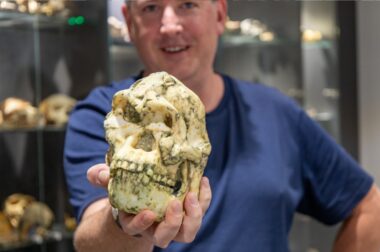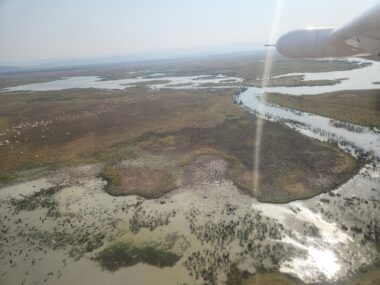Dozens of Science Week stories around Western Australia
- 140,000 years in 30 minutes: The Earth Above: a full-dome planetarium show
- Bomb bacteria with beanbags at the Broome STEM Festival
- How to grow a Martian garden
- Meet dark matter hunters and quantum experts
- Bug Barcode Blitz: WA’s creepy crawlies need your help
- What happens when beer brewing goes wrong?
- Unbreakable bones, black holes, Shark Bay, and fantastic rays and where to find them – meet the top young scientists brought to WA by Forest Research Foundation to conduct their research
- Find out about the secret maths of crochet… with cocktails
- Matt the Feral Cat – make and meet this feline fiend in Albany
- Noongar axe making: Indigenous technology and knowledge
- Can you see the stars? Dark skies versus light pollution
More on these highlights below.
Scientists, experts and event organisers are available for interview throughout National Science Week.
Read on for direct contact details for each event or contact Tanya Ha – [email protected] or 0404 083 863.
Visit ScienceWeek.net.au/events to find more stories in your area.
Media centre here. Images for media here.
WA launch event tonight in the new Boola Katitjin building at Murdoch Uni
National Science Week kicks off tonight at 6pm at Murdoch University with a look at species survival.
Launch event with:
- Hon Stephen Dawson MLC, Minister for Science
- Professor Peter Klinken AC, Chief Scientist of WA and Patron of WA National Science Week
- Professor Kadambot Siddique, UWA Institute of Agriculture and 2023 WA Scientist of the Year
- Dr Rochelle Steven, School of Environmental and Conservation Sciences, Murdoch University.
Where: Murdoch University, Boola Katitjin (Building 360), The Rosemary Van de Berg room
Media enquiries: Chloe Jensen, [email protected] or 0408 338 420.
Monday 5 August. Event details: events.humanitix.com/official-launch-of-national-science-week-wa
National Science Week in WA: highlights
140,000 years in 30 minutes: The Earth Above: A Deep Time View of Australia’s Epic History – Perth
‘Connecting to Science through Stories and Sky’ screens a full-dome planetarium show from the Australian Research Council Centre of Excellence for Australian Biodiversity and Heritage (CABAH).
Produced by Deakin MotionLab in collaboration with First Nations communities and UOW Science Space, The Earth Above: A Deep Time View of Australia’s Epic History explores Australia’s past 140,000 years through the lens of traditional and scientific knowledge.
During National Science Week, the International Centre for Radio Astronomy Research (ICRAR), an equal joint venture between Curtin University and The University of Western Australia, presents a special screening and gathering of artists and speakers at Scitech Planetarium.
Thursday 15 August: www.scienceweek.net.au/event/connecting-to-science-through-stories-and-sky/west-perth/
Media enquiries: Charlene D’Monte, [email protected] or 0468 579 311
Bomb bacteria with beanbags at the Broome STEM Festival – Broome
Extract DNA from strawberries, join yarning sessions on First Nation science, and ‘kill’ bacteria with mini beanbags at the second annual Broome STEM Festival.
The festival brings scientists, educators, displays and activities from the Telethon Kids Institute to WA’s Kimberly region to provide fun, free education sessions for students and community members. The event aims to celebrate and highlight scientists from the local region as well as promote science as a potential career opportunity. The festival will also explore the principles of two-way science, highlighting the rich tradition of Indigenous Australian scientific knowledge.
Wednesday 7 August. Event details: www.scienceweek.net.au/event/broome-festival-of-stem-2/broome
Media enquiries: Caitlin Sweeney, [email protected] or 0425 437 605.
Touring medical research scientists available for media interviews. Images and video from last year’s event available.
How to grow a Martian garden – Crawley
Could you live in a Martian garden? Human missions to the moon and Mars are planned over the next 30 years but can these extreme environments provide habitat for humans?
‘The Martian Garden’ events across South Australia, Victoria and Western Australia invite the public to explore the challenges and try their hand at life beyond Earth at four activity stations while Mars rovers roam nearby.
Visitors will see plant growing cabinets similar to those on the International Space Station, they can code plant bots to harvest produce, find out what makes different foods suitable for space, and explore a range of space crops including duckweed, microgreens, tomato, strawberry and chilli.
Hear from ARC Centre of Excellence in Plants for Space researchers about selecting and adapting plant and microbial species to survive and thrive in new and extreme environments, how to support sustainable new ecosystems off-world, and how to find novel approaches back on Earth.
From Friday 9 August. Event details: www.scienceweek.net.au/event/the-martian-garden-8/crawley-perth/
Media enquiries: Lieke van der Hulst, [email protected] or 08 8313 6669; Frazer Thorpe, [email protected] or 0459 762 299.
Scientists available for media interviews.
Dark matter on the move – Perth, Kununurra & Broome
Meet dark matter hunters and quantum experts at events across Australia.
The National Quantum & Dark Matter Road Trip will tour pubs and schools in cities and towns around Australia starting off at the University of Queensland in Brisbane, then heading to Dalby, Cloncurry, Ballarat, Sydney, Perth, Kununurra, Broome, Dandenong, Melbourne and many other places between 4 August and 19 August.
Dark matter accounts for 84 per cent of all the matter in the Universe… but we don’t yet know what it is. Australia is a key player in the quest to find out.
Quantum technologies are crucial in the hunt for dark matter and they’re already used in smart phones and cars, medical imaging, manufacturing, and navigation. But today’s technologies capture only a small fraction of the potential of quantum physics.
Media enquiries: Fleur Morrison, [email protected] or 0421 118 233.
Multiple experts involved with different legs of the tour are available for media interviews, including dark matter enlightener Jackie Bondell and particle physicist Ben McAllister.
Bug Barcode Blitz: WA’s creepy crawlies need your help – online
Western Australia is covered in bugs. Roughly the size of Western Europe, the state is home to everything from assassin bugs to stink bugs, and even an ant species named after Voldemort, from Harry Potter fame.
But nobody knows the true scale of invertebrate species in Australia, with less than 30% identified.
WA Bug Barcode Blitz 2024 is on a mission to remedy this, enlisting schools and regional communities to help discover and catalogue insects and arachnids using DNA barcoding, ahead of a ‘big reveal’ of potential new species. Selected specimens may also be sent to Murdoch University for conservation research.
Wednesday 14 August & Saturday 17 August (live-streamed sessions on DNA barcoding guided by Murdoch University experts): www.scienceweek.net.au/event/wa-bug-barcode-blitz-2024/
Media enquiries: Pauline Charman, [email protected] or 0410 613 736 / Samantha Ferguson, [email protected] / Katherine Sambrook, [email protected].
The science of beer – Joondalup
What happens when the science of brewing goes wrong?
What processes go into making a good, marketable beer?
Find out from experts and brewers and taste a few different kinds of beer at the Edith Cowan University Birra Bar.
Thursday 15 August. Event details: www.scienceweek.net.au/event/the-science-of-beer/joondalup/
Media enquiries: Cass Rowles, [email protected] or 08 6304 2467.
Unbreakable bones, black holes, Shark Bay, and fantastic rays and where to find them - Crawley, WA
- Fantastic rays and where to find them
- Dude, where's my black hole?
- How the oceans made maths and fieldwork hold hands in Shark Bay
- The perception of time in chemistry and the moving image
- A journey to the centre of a neutron star
- Sound production and reception in marine animals
- Plants that rock: can seaweed sequester carbon?
- Going viral: viruses to treat infections
- Looking at a billion-kilometre-long black hole jet with an earth-sized telescope
- The million-dollar man: unbreakable bone.
Meet and hear from top young scientists working in astronomy, marine biology, the human body, energy, and virtual reality at Forrest Research Foundation’s Showcase event.
The Forrest Research Foundation attracts outstanding young minds from around the world to Western Australia’s five universities to undertake high quality research with the potential to change the world.
Saturday 17 August. Event details: www.scienceweek.net.au/event/forrest-research-foundation-national-science-week-showcase/crawley
Media enquiries: Neil Robinson, [email protected] or 08 6488 5598.
Crochet: where maths meets craft with cocktails – Joondalup
Create your own hyperbolic geometry shape with yarn at Birra Bar at Edith Cowan University and learn the pattern from ECU mathematician Dr Julia Collins, while sipping on a specialty cocktail.
Julia is co-founder of Maths Craft Australia and has a PhD in 4-dimensional knot theory from the University of Edinburgh. She shares the maths that underpins crochet in a workshop-cocktail party.
You will need to have mastered the basic crochet stitch to take part in this workshop. It is not for absolute beginners, and you can BYO yarn and hooks if you like.
Thursday 22 August. Event details: www.scienceweek.net.au/event/crochet-and-cocktails/joondalup
Media enquiries: Cass Rowles, [email protected] or 08 6304 2467.
Julia Collins is available for media interviews.
Meet Matt the Feral Cat – Albany
A play that explores the CATastrophic impact our feline friends can inflict on possums, phascogales, lizards, and other local creatures in the Great Southern.
‘Matt the Feral Cat’ uses the magic of puppetry to highlight the threat of cats to native wildlife, the science behind their control, and how we can all protect species.
Working with Spare Parts Puppet Theatre, locals will create a giant feral cat puppet using recycled plastic waste material and local native animal paper puppets from paper material that usually ends up in the bin.
The event culminates in a musical play about ‘Matt the Feral Cat’ to highlight local species, their threats, and protective measures that can assist their protection through community and scientific collaboration.
Friday 16 August. Event details: www.scienceweek.net.au/event/matt-the-feral-cat/albany
Media enquiries: Jenni Loveland, [email protected] or 0409 572 240
Sarah Comer, regional ecologist with the Dept of Biodiversity, Conservation and Attractions is available for limited media interviews.
Noongar axe making – Kondinin
Wadjak and Balardong Noongar man Dylan Collard wants to share the technology of his ancestors, who were Australia’s first engineers and technologists.
He’s giving Kondinin locals the opportunity to sharpen their skills and learn about First Nations science through an axe making workshop. He will guide participants through the process of creating an axe (kodj), including preparing the materials – grinding balga sap, charcoal, and yonga goona (kangaroo poo) – and creating fire through friction with a stick.
Monday 19 August. Event details: www.scienceweek.net.au/event/the-first-scientists-2/kondinin
Media enquiries: Toni Smeed, Kondinin Community Resource Centre, [email protected], 08 9889 1117.
Why can’t you see the stars? – online
What happened to the night sky? The Milky Way is no longer visible to an estimated third of humanity, including more than half of Australians, thanks to light pollution.
This August, the ABC is exploring the dark sky and the impact of light pollution on science, creatures, and culture. Light pollution in the night sky is a problem for astronomers and stargazers, it confuses the circadian rhythms of some creatures and misguides the navigation of others, impacts Sky Country and Indigenous cultural practices and contributes to sleep deprivation in humans.
ABC Science will invite people to explore the dark sky, contribute to an Australian National University study of the Milky Way’s visibility, see solutions to light pollution, stargaze with Radio National and guest astronomers, and vote in their poll on ‘the most amazing thing you’ve seen in the night sky.’
Monday 31 July – Friday 16 August: www.scienceweek.net.au/exploring-dark-skies-with-abc/ or www.abc.net.au/nightsky.
Media enquiries: Shelley Thomas, [email protected] or 0416 377 444.
Scientists available for media interviews, including Carol Redford (aka Galaxy Girl), founder and CEO of Astrotourism WA.
About National Science Week
National Science Week is Australia’s annual opportunity to meet scientists, discuss hot topics, do science and celebrate its cultural and economic impact on society – from art to astrophysics, chemistry to climate change, and forensics to future food.
First held in 1997, National Science Week has become one of Australia’s largest festivals. Last year about 2.7 million people participated in more than 1,860 events and activities.
The festival is proudly supported by the Australian Government, CSIRO, the Australian Science Teachers Association, and the ABC.
In 2024 it runs from Saturday 10 to Sunday 18 August. Event details can be found at www.scienceweek.net.au.



